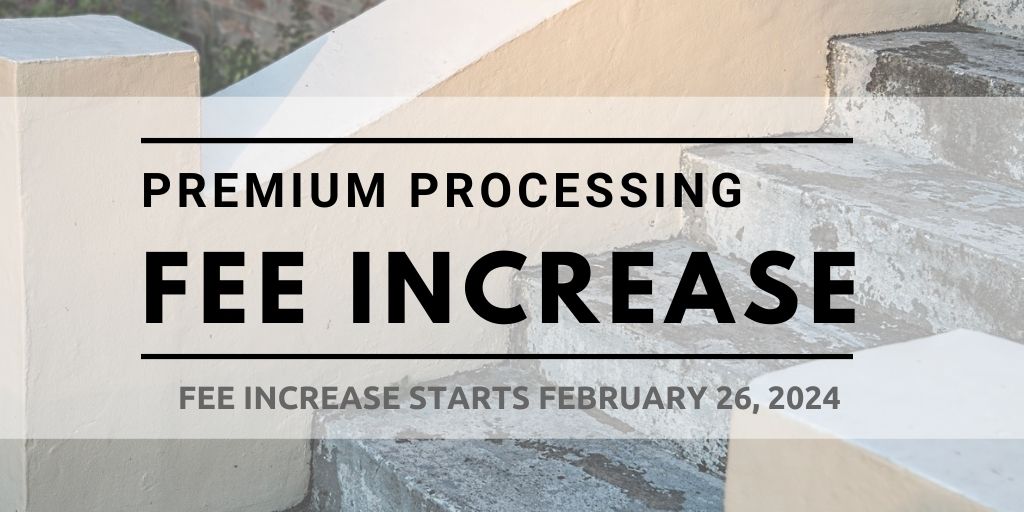USCIS Increases I-907 Premium Processing Filing Fee Starting February 26, 2024
The Department of Homeland Security has announced an inflation-based increase of the I-907 premium processing filing fee starting February 26, 2024. The most common $2,500 premium processing filing fee goes up to $2,805 with an average increase of approximately 12%.
Rationale of Fee Increase and Effective Date
The USCIS Stabilization Act established the current premium processing fees and the authority for the Department of Homeland Security to adjust the premium fees on a biennial basis. After leaving these fees unchanged for the three years following the passage of the Act, DHS now is increasing the premium processing fees USCIS charges for all eligible forms and categories to reflect the amount of inflation from June 2021 through June 2023 according to the Consumer Price Index for All Urban Consumers.
If USCIS receives a Form I-907 postmarked on or after Feb. 26, 2024 with the incorrect filing fee, they will reject the filing and return the filing fee. For filings sent by commercial courier (such as UPS, FedEx, and DHL), the postmark date is the date reflected on the courier receipt.
New Premium Processing Fees Starting February 26, 2024
| Application or Petition Form | Previous Fee | New Fee |
|---|---|---|
| Form I-129, Petition for a Nonimmigrant Worker |
$1,500 (H-2B or R-1 nonimmigrant status)
$2,500 (All other available Form I-129 classifications (E-1, E-2, E-3, H-1B, H-3, L-1A, L-1B, LZ, O-1, O-2, P-1, P-1S, P-2, P-2S, P-3, P-3S, Q-1, TN-1, and TN-2))
|
$1,685 (H-2B or R-1 nonimmigrant status)
$2,805 (All other available Form I-129 classifications (E-1, E-2, E-3, H-1B, H-3, L-1A, L-1B, LZ, O-1, O-2, P-1, P-1S, P-2, P-2S, P-3, P-3S, Q-1, TN-1, and TN-2))
|
| Form I-140, Immigrant Petition for Alien Worker | $2,500 (Employment-based (EB) classifications E11, E12, E21 (non-NIW), E31, E32, EW3, E13 and E21 (NIW)) | $2,805 (Employment-based (EB) classifications E11, E12, E21 (non-NIW), E31, E32, EW3, E13 and E21 (NIW)) |
| Form I-539, Application to Extend/Change Nonimmigrant Status | $1,750 (Form I-539 classifications F-1, F-2, M-1, M-2, J-1, J-2, E-1, E-2, E-3, L-2, H-4, O-3, P-4, and R-2) | $1,965 (Form I-539 classifications F-1, F-2, M-1, M-2, J-1, J-2, E-1, E-2, E-3, L-2, H-4, O-3, P-4, and R-2) |
| Form I-765, Application for Employment Authorization | $1,500 (Certain F-1 students with categories C03A, C03B, C03C) | $1,685 (Certain F-1 students with categories C03A, C03B, C03C) |
Premium Processing Details
Please see this alert with more detailed information about the premium processing service including eligibility, fees and timelines.
General USCIS Filing Fee Increase to Follow Starting April 1, 2024
Additionally, USCIS is raising their filing fees with some significant increases for employers. The new fees are in effect on April 1, 2024. See our alert.
Conclusion
We hope that the fee increase would allow USCIS to be able to increase staffing levels and to increase the level of service.
We invite you to subscribe to our free weekly immigration newsletter to receive timely updates on this and related topics. We also invite you to contact us if our office can be of any assistance in your immigration matters or you have any questions or comments about this USCIS fee increase.
Related News and Articles
The Capitol Immigration Law Group has been serving the business community for over 15 years and is one of the most widely respected immigration law firms focused solely on U.S. employment-based immigration. Disclaimer: we make all efforts to provide timely and accurate information; however, the information in this article may become outdated or may not be applicable to a specific set of facts. It is not to be construed as legal advice.

